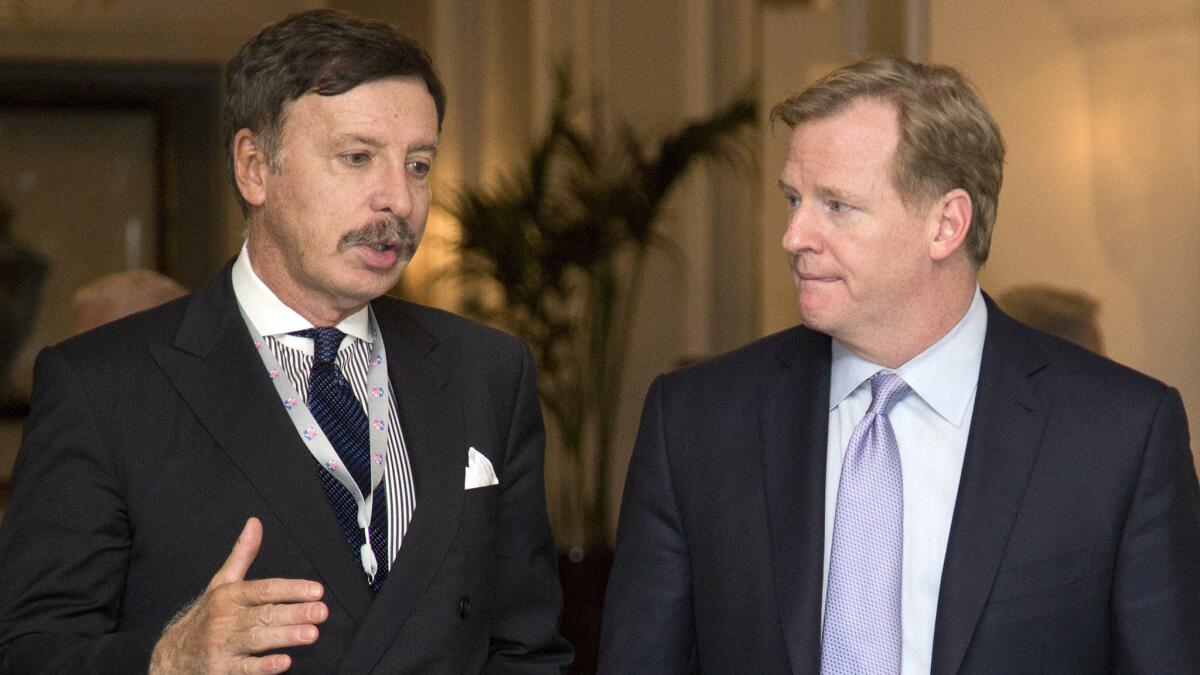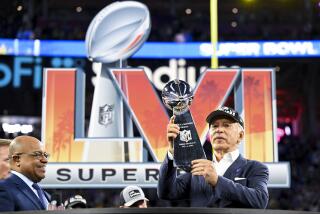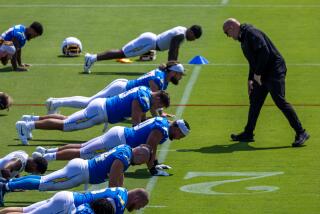NFL reminds teams that only the league can make relocation decisions

As the owner of the St. Louis Rams inches closer to a possible relocation of his team to Los Angeles, the NFL reminded all 32 teams Monday that the league as a whole — and not an individual club — will make the major decisions regarding relocation.
The memo was provided to The Times by an individual not authorized to speak on behalf of the league.
The league declined to comment on the memo, in which Commissioner Roger Goodell announced the new Committee on Los Angeles Opportunities, consisting of owners Clark Hunt of Kansas City, Robert Kraft of New England, John Mara of the New York Giants, Bob McNair of Houston, Jerry Richardson of Carolina, and Art Rooney of Pittsburgh.
The committee will “evaluate the various stadium options available in Los Angeles, oversee the application of the relocation guidelines in the event that one or more clubs seek to move to Los Angeles, ensure proper coordination with other standing committees … and confirm that all steps taken in Los Angeles are consistent with the Constitution and Bylaws and NFL policies.”
Although the memo does not specifically name the Rams, San Diego Chargers or Oakland Raiders — all three on year-to-year leases and mulling a relocation — it is clearly a reminder to them that the league has no intention of straying from protocol and allowing a club to unilaterally decide to move and begin construction of a stadium in the L.A. area.
Last month, Rams owner Stan Kroenke announced plans to build an 80,000-seat football stadium on the Hollywood Park site, nearly 300 acres in Inglewood.
The memo reads:
“In particular, as has been discussed on numerous occasions and confirmed in various memoranda, any decision to resume NFL team operations in Los Angeles will require multiple approvals from NFL ownership, which can only be granted by a three-fourths vote of the clubs. These decisions include selection of a stadium site; approval of stadium lease and financing arrangements; and debt ceiling and sharing waivers (if needed); relocation consent and terms; and Super Bowl awards, among other subjects. A key role of this Special Committee will be to preserve the voting rights of the clubs on each of these important issues.”
In an interview with The Times last month, Rooney, speaking on behalf of the ad hoc committee, said: “I think we’re comfortable that we could stop a team legally from moving if it didn’t go through the process.”
The NFL does not have a strong history of successfully blocking teams from relocating. The only instance in the modern era of a team moving to a new city, then reversing its decision after pressure from the league, came in 1996, when the Seattle Seahawks set up operations for one week in Anaheim.
At that time, Ken Behring, then owner of the Seahawks, immediately returned his team to Seattle when then-Commissioner Paul Tagliabue threatened to impose fines on the club.
In all other cases, teams that have moved have either been successful in litigation or have reached settlements with the league enabling them to stay. However, since the Raiders and Rams left Southern California after the 1994 season, the NFL has strengthened its relocation guidelines, and won a legal battle with the late Raiders owner Al Davis regarding his claim that he owned the rights to the L.A. market.
If a team were to move without the league’s blessing — and people close to Kroenke insist he would not be inclined to do so — the NFL could withhold stadium financing and choose not to award Super Bowls to the new venue as a disincentive. However, an owner who went rogue and moved would not necessarily be subject to a relocation fee.
In his state-of-the-NFL news conference at the Super Bowl, Goodell said NFL owners take “very seriously” the obligation to vote “on any serious matter, including relocation of a franchise.”
“There’s a relocation policy that is very clear,” he said. “We have shared it with our ownership over the last several years. We have emphasized the point, in each of those meetings, that there will be at least one vote, if not multiple votes, if there is any relocation. We would have potentially the relocation itself, potential stadium funding, potential Super Bowls.”
Follow Sam Farmer on Twitter @LATimesFarmer
More to Read
Go beyond the scoreboard
Get the latest on L.A.'s teams in the daily Sports Report newsletter.
You may occasionally receive promotional content from the Los Angeles Times.











